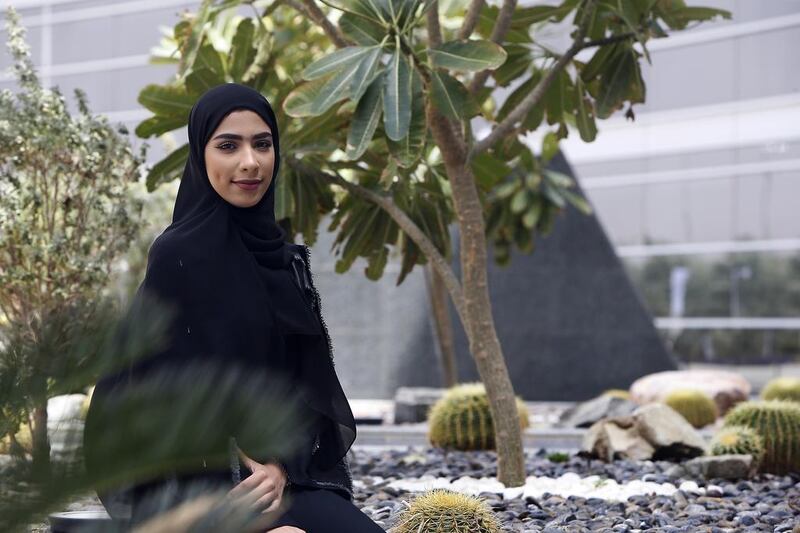AL AIN // Most students walk past discarded water bottles and litter, and not bat an eyelid. But Sheikha Al Shamsi, 19, makes it her daily duty to conserve, re-use and protect the environment.
From donating clothes to those in need, to bringing flowers to the local mosque for worshippers to enjoy, she is a conscientious person.
Jamal Arif is one of her teachers at UAE University.
He observed some of the selfless student’s habits before getting to know her, daily desk clearing and tidying – traits he did not see in others.
“One day, I was sitting at my desk and saw four or five bottles of water being collected by a student,” Mr Arif says. “I ignored it and then I saw it happen again. I saw a girl pick them up from the desks and take them with her.”
“When it happened a third time I had to ask her what was going on.
“I learnt that she goes around the class before it starts, picking up the rubbish and putting it in the bin. She collects the water bottles and puts the water from the half-emptied bottles into one or two bottles, then waters the plants on her way home.
“She doesn’t like wastage and wants to conserve things. She realises water is a scarce resource.”
Ms Al Shamsi went told the teacher about her other interests – collecting used clothes, cleaning them, packaging them and donating to those in need.
She also donates water bottles in her mosque in RAK for those praying. She always carries water in her car for those who might need it.
Mr Arif, who has spent four years at the university, says: “I’ve never seen a student do this kind of work, or anything like this.”
Ms Al Shamsi is humble. The student in her second year of studies in entrepreneurship says: “I’ve always seen this in my parents, so I’ve done this on a daily basis for as long as I can remember.
“I’ve been taught that you can’t waste anything. If you waste it, we will all waste and we will all be poor in the end. I don’t want my country to live in poverty, to have to use recycled water, so I need to preserve it. If God takes it back, he will never give it back again.”
Mr Arif says she is special.
“Emiratis are taught they will be looked after, but Sheikha is something very different to anyone I’ve seen before,” he says.
Ms Al Shamsi’s faith plays a big role in her actions.
“Prophet Mohammed used to not waste anything. He was born at a time when nothing was provided. Everything was difficult. I did some research myself but this is what I’ve been taught since school. I can’t pretend I haven’t heard that. It affected me from a young age. I was born in a country where everything is provided, but some people are not.
“If I was born in such a country as this, I should be thankful by not wasting things. If we all waste, then we will all end up being miserable.”
Her mother also offers support to women at a local Quran reading group, while they also support charities such as Dar Al Ber.
“I can’t just buy a shirt for Dh200 and then throw it away,” says Ms Al Shamsi.
“Even if I’ve eaten in a restaurant but can’t finish the food, I just take it away and give it to someone in the street.”
Leaving flowers at her mosque, she says, is a way to motivate the many young people who go there, to return, trying to make the experience as enjoyable as possible for others.
“I do it every weekend,” she says, when she returns home to RAK from her student housing in Al Ain. “If it doesn’t look nice when they go, they won’t keep going back.”
Mr Arif said: “For someone of 19, she has a thought process that looks at the wider picture. I would expect that to come at a much older age. She is a real role model.”
mswan@thenational.ae






